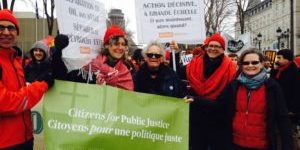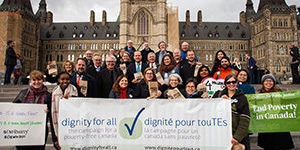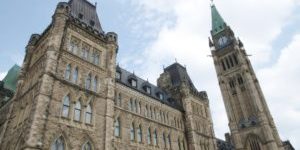Citizens for Public Justice calls for stronger refugee resettlement in Canada
FOR IMMEDIATE RELEASE
Ottawa, ON: Nov. 2, 2017 — Yesterday, Immigration, Refugees, and Citizenship Canada (IRCC) released details of the 2018-2020 Immigration Levels Plan. CPJ was pleased that our recommendation to set multi-year levels was adopted—the first such plan in nearly two decades. The plan outlines, among other things, the number of Government-Assisted Refugee (GAR) and Privately-Sponsorship Refugee (PSR) allocations for the next three years.
Citizens for Public Justice (CPJ) has been calling for greater generosity in Canada’s resettlement system for some time. Along with the Canadian Council for Refugees (CCR), CPJ recommended a specific target of 20,000 GARs in 2018. In 2016, Canada showed that we have the capacity to expand our refugee resettlement efforts and admit more asylum-seekers into our communities. While thousands of individual Canadians have shown a willingness to sponsor refugees, low government limits impede this generosity.
“More than 1.9 million people are refugees in need of resettlement worldwide today—more than any time since World War II,” said CPJ’s Executive Director, Joe Gunn. “CPJ encourages IRCC to set more generous refugee settlement levels, clear backlogs, and reduce wait times in the system.”
But in 2018, the government plans to maintain its 2017 GARs target, which fell to 7,500 from the 25,000 spots that had been allocated in 2016. In 2019, GARs will only increase to 8,500, and then 10,000 in 2020. The number of PSR applications processed will rise slightly, from 16,000 in 2017, to a projected 18,000 in 2018, with an increase of 1,000 in the two subsequent years.
In a report presented to the House of Commons on Aug. 16, 2017, the government explained, “The levels plan is a public expression of the Government’s immigration priorities.” “Unfortunately, this plan indicates a lack of government willingness to lead global efforts to tackle the current refugee crisis,” Gunn said.
In the same document, the government said, “Ensuring sufficient admissions spaces in the levels plan is a key part of any strategy to tackle processing times, [which] become lengthy when admission levels are lower than the number of applications received.” Increased levels are a necessary step in addressing the critical issue of long wait times in the resettlement system. While the government has promised to clear the backlog of private sponsorship applications by 2019, its failure to adequately increase PSR levels renders this task difficult.
Commendable in this year’s plan is the government’s multi-year approach, which will allow for more predictable sponsorship planning. As well, the move to increase the overall number of immigrants on an annual basis is a positive one. CPJ is pleased to see positive movements in these areas. Still, a greater commitment to the immigration categories of “humanitarian and other” and family class would better provide a human rights-based approach to immigration.
CPJ is concerned by the disconnect between the government’s stated position towards refugee resettlement and these insufficiently increased admission levels. With such low targets, especially as it relates to GARs, too much of the burden of refugee resettlement will continue to weigh on individual sponsors. Canadian citizens are more than willing to assist refugees, but our government must show that it too will do its part. Now more than ever, Canada must lead with generosity in its response to the ever-escalating global refugee crisis.
-30-
For more information, contact Deborah Mebude at or 613-232-0275 x. 232.
For background on refugee resettlement in Canada, please see http://justice.crcna.org/sites/default/files/Refugee%20action%20alert-%20Sept.%202017%20-backgrounder.docx%20%281%29.pdf




